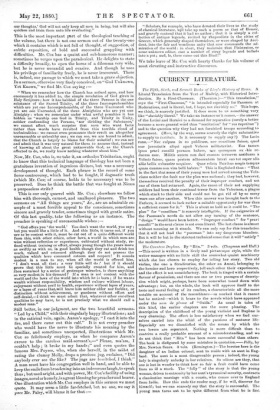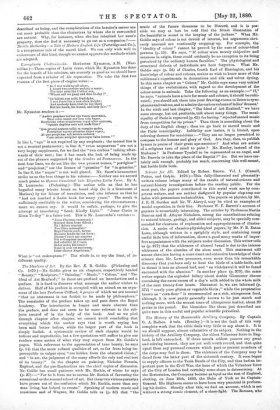The Countess Daphne. By "Rita." 3 vols. (Chapman and Hall.)
—This novel is written in a lively and picturesque style, while the writer manages with no little skill the soniewhat quaint machinery which she has chosen to employ for tolling her story. Two old violins, the one a Stradivarius, the other an Amati, belonging to the heroine and hero respectively, tell each other their experiences, and the effect is not unsatisfactory. The book is tinged with a certain flavour of pessimism, and there aro one or two passages of descrip- tion which might, perhaps, have been somewhat toned down with advantage ; but, on the whole, the book will approve itself to the taste and moral feeling of its readers, a characteristic all the more notable on account of the resemblance—so marked that it cannot but be noticed—which it bears to the novels which have appeared under the nom de plume of " Onida." As usual in tales of this kind, the earlier chapters are the more pleasing. The description of the childhood of the young violinist and Daphne is very charming. The effect is less satisfactory when we find our- selves carried into the whirl of the passions of maturor life- Especially are we dissatisfied with the means by which the two lovers are separated. Nothing is more difficult than to contrive a really probable account of a misunderstanding, and we do not think that " Rita " has been more successful than others The book is disfigured by some mistakes in quotation.—Folly, by Mrs. Newton Sears. 3 vols. (Remington.)—The heroine here is the daughter of an Indian colonel, sent to reside with an aunt in Eng- land. The aunt is a most disagreeable person ; indeed, the young lady is singularly unlucky in her relatives. So odious are they, that one is lost in wonder to think how so fair a fruit could have come from so ill a stock. The " folly " of the story is that the young woman, driven to extremity by her aunt's tyrannical severity, contracts a clandestine marriage with a cousin, who comets over to England from India. How this ends the reader may, if he will, discover for himself; but we can scarcely say that the story is successful. The young man turns out to be quite different from what he is first described 82 being, and the complications of the heroine's career are not more probable than the characters by whom she is surrounded are natural. Why, for instance, when she has inhe,tited her aunt's property, does she find it necessary to go out as a companion P- Neville Hatherley : a Tale of Modern English Life (Partridge and Co.), is a temperance tale of the moral kind. We can only wish well to endeavours of this kind, though we cannot approve the methods which are adopted.



































 Previous page
Previous page